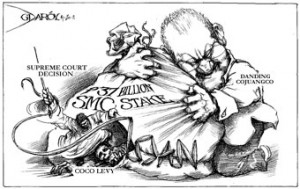Devil did it
TO THE modern mind, does the devil still exist? One way to gauge the answer is to ask ourselves: What did we think after the famous actress Pilar Pilapil—who was stabbed several times and left bleeding to death in a still-puzzling, unsolved and apparently random crime last week—described her harrowing experience in this way: “I was attacked by the devil.” The question is especially worth asking in the middle of Holy Week, when this largely Christian nation takes a collective break to mark the holiest days of the Christian calendar.
Many of us might respond that we do believe in the devil, in the metaphorical sense. The devil, in this understanding, is the symbol, the personification, of the oppressive reality of evil. The inhumanity of some horrific types of crimes (the premeditated massacre, the gang rape, the calculated plunder of people’s taxes, and so on ad nauseam) calls for a reinterpretation of what it means to be human; surely, we think, those who gleefully perpetrated the massacre in Ampatuan, Maguindanao on Nov. 23, 2009 had reverted to their animal nature, had turned into beasts. The 15 men who took turns raping a drugged girl in Navotas last Sunday must have forgotten everything they had ever learned, and slunk back into the darkest recesses of the animal kingdom. Surely, we think, this is the work of the devil, understood figuratively.
Others might respond that even the metaphorical use of the devil in criticizing those the greater community perceives as outsiders or sinners or transgressors can turn dangerous—and that therefore the modern mind must guard itself against such use. To demonize the outlaw, no matter how outrageous, how beyond the pale his crime is, is to promote intolerance and, ultimately, to celebrate an aggressive ignorance. To demonize the masterminds behind, say, the deliberate misuse of the fertilizer fund in 2004 to ensure Gloria Macapagal-Arroyo’s election would only be counter-productive, distracting us from the serious but tedious task of proving the charges in trial or impeachment court.
Still others might answer that belief in the devil, even in only the metaphorical sense, is a throwback to the medieval age, that era in history usually (but incorrectly) thought of as the Dark Ages, and that it prevents a scientific or rationalistic approach to the problem of evil. In this understanding, the use of the devil to explain the commission of terrifying crimes only ensures our failure to understand the structural underpinnings of modern-day evil. To personify the problem is to excuse ourselves from investing in education, from eliminating corruption in government offices, from neutralizing warlords and disbanding private armies once and for all.
Reasonable approaches all, but Pilapil’s account of her experience leaves no room for doubt that, in her own understanding, the devil does exist, and he attacked her. In fact, as a close friend of hers recalls it: “Pilar said, ‘I was really attacked by the devil.’”
Some of us might dismiss this statement as the fruit of Pilapil’s years as a Born-Again Christian: Her faith taught her to think in terms of God and devil and, naturally enough, when the attack happened, she used those terms to try to make sense of it all. If she were an absolutist Darwinian, she would have characterized the attack as a crisis which she was fit enough to survive.
But that would be to miss the point. Pilapil was mercilessly attacked, and left for dead. The evil in the heart of the two alleged car thieves who brutalized her cries out to be understood, not merely as a social symptom, or a reflection on economic conditions or the state of government, but as a personal, and therefore spiritual, act. It may be a sign of modernity to ascribe the evil that was done to everything but the devil, but as Pope Benedict XVI has explained so limpidly in such books as “Light of the World,” the Christian faith does not see a contradiction between modernity and morality. There is nothing wrong in understanding a crime as both an indictment of society’s failures, and as sin triumphant. In the Christian faith, that triumph is only temporal, and temporary.
















